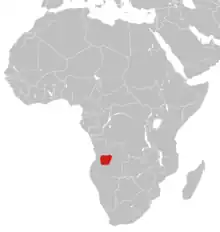Bitis heraldica
Bitis heraldica is a venomous viper species endemic to Angola.[1][3] It is easily distinguished from B. caudalis by its heavily speckled belly and lack of any supraocular "horns".[4] No subspecies are currently recognized.[3][5]
| Bitis heraldica | |
|---|---|
| Scientific classification | |
| Domain: | Eukaryota |
| Kingdom: | Animalia |
| Phylum: | Chordata |
| Class: | Reptilia |
| Order: | Squamata |
| Suborder: | Serpentes |
| Family: | Viperidae |
| Genus: | Bitis |
| Species: | B. heraldica |
| Binomial name | |
| Bitis heraldica (Bocage, 1889) | |
 | |
| Synonyms | |
Description
The maximum recorded total length (body + tail) is 405 mm (15.9 in).[4]
Distribution and habitat
It is found on the high plateau of central Angola.[2]
The type locality given is "sur les bords de la rivière Calae, l'un des affluents de Cunene, entre le 13o et 14o parallèle á l'est de Caconda." [Calai River (tributary of the Kunene), Cacanda, Angola.[2]
It commonly inhabits rocky mountain slopes.[4]
Behavior
Nothing is known of its behavior, as less than 20 specimens have ever been collected.[4]
References
- Ceríaco, L.M.P. (2021). "Bitis heraldica". IUCN Red List of Threatened Species. 2021: e.T22475207A22475216. doi:10.2305/IUCN.UK.2021-3.RLTS.T22475207A22475216.en. Retrieved 4 February 2022.
- McDiarmid RW, Campbell JA, Touré T. 1999. Snake Species of the World: A Taxonomic and Geographic Reference, Volume 1. Herpetologists' League. 511 pp. ISBN 1-893777-00-6 (series). ISBN 1-893777-01-4 (volume).
- Bitis heraldica at the Reptarium.cz Reptile Database. Accessed 4 February 2022.
- Spawls S, Branch B. 1995. The Dangerous Snakes of Africa. Ralph Curtis Books. Dubai: Oriental Press. 192 pp. ISBN 0-88359-029-8
- "Bitis heraldica". Integrated Taxonomic Information System. Retrieved 4 February 2022.
- Mallow D, Ludwig D, Nilson G. 2003. True Vipers: Natural History and Toxinology of Old World Vipers. Malabar, Florida: Krieger Publishing Company. 359 pp. ISBN 0-89464-877-2.
Further reading
- Bocage JVB du. 1889. Mélanges erpétologiques. II. Sur une Vipère apparemment nouvelle d'Angola. Jornal de Sciencias Mathematicas, Physicas e Naturaes, Academia Real das Sciencias de Lisboa, Segunda Série 1: 127-128. (Vipera heraldica, nov. sp.)
This article is issued from Wikipedia. The text is licensed under Creative Commons - Attribution - Sharealike. Additional terms may apply for the media files.
